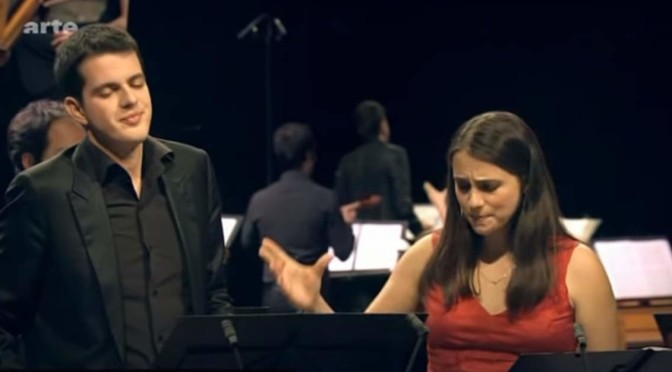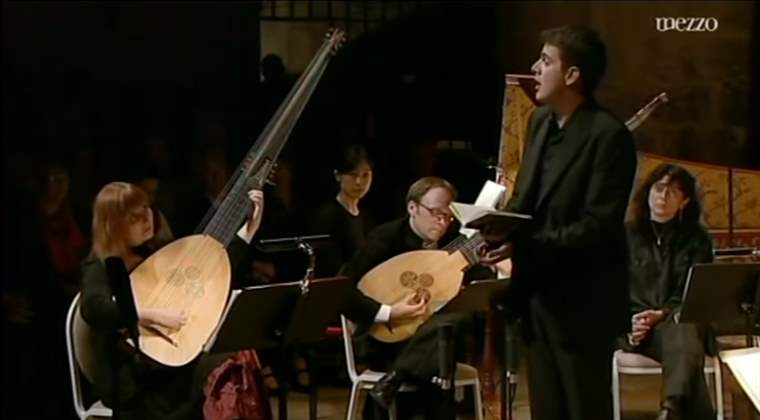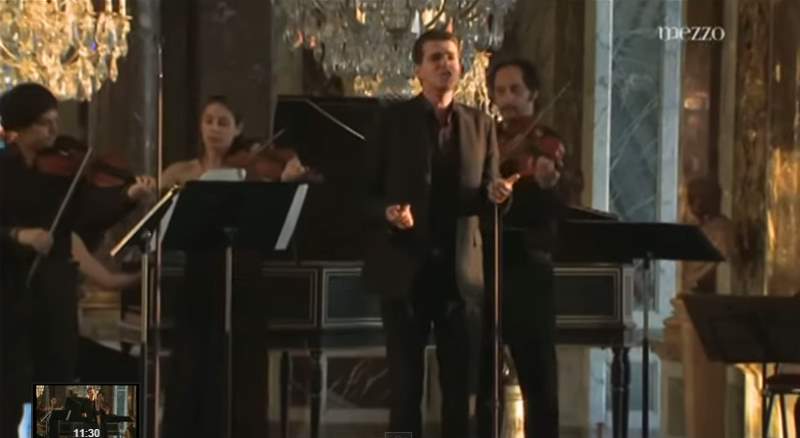A concert titled Voix Haute (aloud): French countertenor Philippe Jaroussky and Spanish soprano Nuria Rial sing Baroque era arias from Händel, Strozzi, Ferrari, and Caccini, with Jaroussky’s own Early Music Ensemble, L’Ensemble Artaserse.
Voix haute Program
With the starting times in the video:
- 00:00 George Frideric Händel: Venti, turbini, prestate – Rinaldo
- 04:51 George Frideric Händel: Ombra cara – Radamisto
- 13:17 Barbara Strozzi: L’eraclito amoroso
- 19:42 Benedetto Ferrari: Amanti, io vi so dire
- 23:37 George Frideric Händel: Se vago rio – Aminta e Fillide
- 27:26 George Frideric Händel: Al dispetto di sorte crudele – Aminta e Fillide
- 29:22 George Frideric Händel: Per abbatter il rigore – Aminta e Fillide
- 32:25 George Frideric Händel: Io t’abbraccio – Rodelinda
- 39:34 Giulio Caccini: Amarilli, mia bella
1. Venti, turbini, prestate [George Frideric Händel]
from Act I, Scene 2 of the Italian opera Rinaldo (HWV 7) by George Frideric Handel composed in 1711. It is the first Italian language opera written specifically for the London stage. The libretto was prepared by Giacomo Rossi from a scenario provided by Aaron Hill.
Libretto
Di speranza un bel raggio
Ritorna a consolar l’alma smarrita;
Sì adorata mia vita!
Corro veloce a discoprir gl’inganni;
Amor, sol per pietà, dammi i tuoi vanni!
Venti, turbini, prestate
Le vostre ali a questo piè!
Cieli, numi, il braccio armate
Contro chi pena mi diè!
English translation
A beautiful ray of hope
Return to console the lost soul;
Yes, my beloved life!
I run quickly to discover the deceptions;
Love, just out of pity, give me your vanni!
Winds, whirlwinds, lend
Your wings at this foot!
Heavens, gods, the armed arm
Against those who gave me grief!
2. Ombra cara [George Frideric Händel]
From Radamisto (HWV 12) is an opera seria in three acts by George Frideric Handel to an Italian libretto by Nicola Francesco Haym, based on L’amor tirannico, o Zenobia by Domenico Lalli and Zenobia by Matteo Noris. It was Handel’s first opera for the Royal Academy of Music.
Libretto
Ombra cara di mia sposa
Deh! Riposa
E lieta aspetta la vendetta che farò!
E poi tosto ove tu stai
Mi vedrai
Venir a volo
E fedel t’abbraccerò.
Ombra cara, etc
English translation
Dear shadow of my bride
Oh! Rests
And happily wait for the revenge I will take!
And then right where you are
You will see me
Come flying
And faithfully I will embrace you.
Dear shadow, etc
3. L’eraclito amoroso [Barbara Strozzi]
A secular aria by Barbara Strozzi (also called Barbara Valle; baptized 6 August 1619 – 11 November 1677), the Italian singer and composer. Her Baroque compositions were published in her lifetime.
Libretto
Udite amanti la cagione, oh Dio!
Ch’a lagrimar mi porta:
Nell’adorato e bello idolo mio,
Che si fido credei, la fede è morta.
Vaghezza ho sol di piangere,
Mi pasco sol di lagrime,
Il duolo è mia delizia
E son miei gioie i gemiti.
Ogni martire aggradami,
Ogni dolor dilettami,
I singulti mi sanano,
I sospir mi consolano.
Ma se la fede negami
Quell’ incostante e perfido,
Almen fede serbatemi
Sino alla morte, O lagrime!
Ogni tristezza assalgami,
Ogni cordoglio eternisi,
Tanto ogni male affligami
Che m’uccida e sotterrimi.
4. Amanti, io vi so dire [Benedetto Ferrari]
“Amanti, io vi so dire” is a baroque aria composed by Benedetto Ferrari, an Italian composer and theorbo player of the early 17th century. Known for his expressive and innovative music, Ferrari’s piece is characterized by its emotional depth, intricate vocal lines, and the rich, harmonious accompaniment typical of the baroque era.
Libretto
Amanti, io vi so dire
ch’è meglio assai fuggire
bella Donna vezzosa
ò sia cruda ò pietosa
ad ogni modo e via
il morir per amor è una pazzia.
Non accade pensare
di gioir in amare,
amoroso contento
dedicato è al momento
e bella Donna al fine
rose non dona mai senza le spine.
La speme del gioire
fondata è sù’l martire,
bellezza e cortesia
non stanno in compagnia,
sò ben dir con mio danno
che la morte ed’amor insieme vanno.
Vi vuol pianti a diluvi
per spegner i vesuvi
d’un cor innamorato,
d’un spirito infiammato;
pria che si giunga in porto,
quante volte si dice:
ohimè son morto.
Credete’l à costui che per prova può dir
io vidi io fui. Se creder no’l volete
lasciate star che poco importa à me.
Seguitate ad’amar ad’ogni modo,
chi dè rompersi il collo.
Non accade che schivi.
Od’erta ò fondo
che per proverbio senti sempre dire
dal destinato non si può fuggire.
Donna so chi tu sei,
amor so i fatti miei.
Non tresco più con voi,
alla larga ambi doi.
S’ogn’un fosse com’io
saria un balordo Amor e non un Dio.
English translation
Lovers, I can tell you
that it is much better to flee
beautiful charming woman
either raw or pitiful
anyway and so on
dying for love is madness.
Thinking doesn’t happen
to rejoice in loving,
happy lover
dedicated is at the moment
and beautiful Woman at the end
roses never give without thorns.
The hope of rejoicing
founded is on the martyr,
beauty and courtesy
they don’t stay together,
I can say this well, to my detriment
that death and love go together.
He wants you to cry in floods
to extinguish the Vesuvius
of a heart in love,
of an inflamed spirit;
before we reach the port,
how many times is it said:
alas, I am dead.
Believe him who can tell by proof
I saw I was. If you don’t want to believe
leave it alone, it doesn’t matter to me.
Continue to love in any case,
who dares break his neck?
It doesn’t happen that you dodge.
The steep is the bottom
that you always hear as a proverb
one cannot escape from the destined one.
Woman I know who you are,
love, I know my business.
I’m not dating you anymore,
stay away from both.
If everyone was like me
It would be a foolish Love and not a God.
5. Se vago rio – Aminta e Fillide [George Frideric Händel]
Se vago rio is an aria from the 1708 secular cantata Aminta e Fillide, HWV 83.
Libretto
Se vago rio
fra sassi frange
l’amato argento,
al fin contento
posa nel mare.
Ma il ciglio mio,
che sempre piange,
non trova seno
che ponga freno
al suo penare.
English translation
If I wander rio
among fringed stones
the beloved silver,
ultimately happy
laying in the sea.
But my eyelash,
who always cries,
can’t find breasts
that puts the brakes on
to his suffering.
6. Al dispetto di sorte crudele – Aminta e Fillide [George Frideric Händel]
Libretto
Al dispetto di sorte crudele,
costante e fedele
quest’alma sarà.
Che se Filli ad amarmi si muove,
son chiare le prove
di sua fedeltà.
English translation
In spite of cruel fate,
constant and faithful
this soul will be.
That if Filli moves to love me,
the evidence is clear
of his loyalty.
7. Per abbatter il rigore – Aminta e Fillide [George Frideric Händel]
Libretto
Per abbatter il rigore
d’un crudel spietato core
forte scudo è la costanza
e il valor di fedeltà.
Volga al cielo i sguardi, ai numi,
chi al fulgor di quei bei lumi
vuol nutrire la sperana
di trovar un dì pietà.
English translation
To take down the penalty
of a cruel, merciless heart
a strong shield is constancy
and the value of loyalty.
Turn your gaze to the sky, to the gods,
some to the brilliance of those beautiful lights
wants to nourish the hope
to find mercy one day.
8. Io t’abbraccio – Rodelinda [George Frideric Händel]
Io t’abbraccio from Rodelinda, regina de’ Longobardi, opera seria by George Frideric Handel, that premiered at the King’s Theatre in the Haymarket in London on 13 February 1725, at the height of his career.
This duet is sung between Rodelinda, Queen of Lombardy, and Bertarido, the usurped King; the role of a king was originally sung by alto castrato while today it is sung by countertenors.
Lyrics
I embrace you.
And more bitter and harsh
than death to my heart is this farewell
which tears us apart.
Ah, my life! Ah, my treasure!
If I do not die, then how cruel is
that distress which brings death,
but does not kill.
Original text:
Io t’abbraccio
E più che morte, aspro e forte,
è pel cor mio questo addio,
che il tuo sen dal mio divide.
Ah mia vita, ah mio tesoro,
se non moro,
è più tiranno quell’affanno,
che dà morte, e non uccide.
9. Amarilli, mia bella [Giulio Caccini]
A secular Soprano solo aria by Giulio Romolo Caccini (also Giulio Romano) (8 October 1551 – buried 10 December 1618), the Italian composer, teacher, singer, instrumentalist, and writer of the very late Renaissance and early Baroque eras. He was one of the founders of the genre of opera and one of the single most influential creators of the new Baroque style. He was also the father of the composer Francesca Caccini.
Italian text
Amarilli, mia bella
Non credi, o del mio cor dolce desio,
D’esser tu l’amor mio?
Credilo pur, e se timor t’assale,
Prendi questo mio strale,
Aprimi il petto e vedrai scritto in core:
Amarilli, Amarilli, Amarailli è il mio amore.
English translation
Amarilli, my beautiful
Do you not believe, my heart’s desire
that it is you I love?
Believe it, and should a shadow of doubt appear–doubt not,
Take this arrow and open my heart, and written inside you will see
Amarilli is my love.
Sources
- Rinaldo (opera) on Wikipedia
- Radamisto (Handel) on Wikipedia
- Pavarotti sings Pourquoi me réveiller [Massenet] at the Central Park in 1993 - April 23, 2024
- Elgar: Serenade for Strings [Concertgebouw Chamber Orchestra] - April 19, 2024
- Mozart: Serenade No. 10 “Gran Partita” [MET Orchestra Chamber Ensemble] - April 18, 2024



